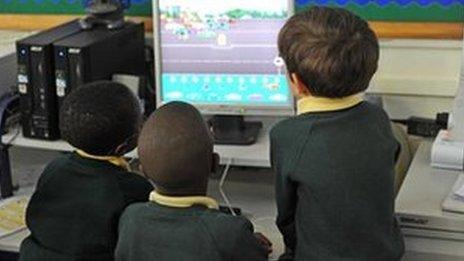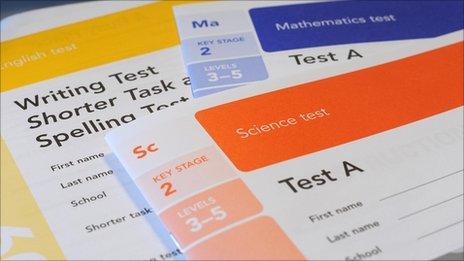Primary school tests to be toughened, says minister
- Published

The new tests and assessments will start in 2016
Assessments for pupils when they start primary school and tougher tests when they leave are part of a new package of measures to monitor school performance.
Ministers says the new tests, to be introduced in 2016, will ensure higher standards and that all pupils receive the attention they deserve.
Most schools in England already assess Reception children on entry to school, but this step will formalise that.
Schools will retain results to measure and track each pupil's progress.
Average achievement
The baseline assessments will be undertaken one-to-one with a member of staff and will focus on some of the key building blocks of learning, such as counting and picture and letter and number recognition.
Schools will be required to publish details of their pupils' progress, which will be measured against the average achievement level of all children in England in the same year group.
The new tests for pupils in their last year of primary school will cover maths, reading, grammar, punctuation and spelling, and children will be expected to reach a higher level than currently.
'Clearer reports'
Schools will have to ensure at least 85% of their pupils achieve the expected standard at age 11, and that pupils make their expected progress from age four, compared with others with a similar level of understanding in reception. Those that are behind on both measures will be judged to be failing.
The present system based on achievement levels - with Level 4 the expected level at age 11 - is being scrapped from this September.
Ministers say these levels are "unambitious, too broad and do not give parents a meaningful picture of how their children are performing".
Instead, schools will be given the freedom to design their own systems of measuring pupil performance and reporting it to parents, including through what ministers say will be "clearer school reports".
Coasting schools
Schools Minister David Laws said: "The new system will mean higher standards, no hiding place for underperforming schools and coasting schools, and real credit being given to schools and colleges which may have challenging intakes but which improve their pupils' performance.
"In primary schools, we are raising the bar to improve standards and introducing a proper measure of progress from when children start school to age 11.
"I want to see all children leaving primary school with a good standard of reading, writing and maths so that they can thrive at secondary school.
"A better start at secondary school is a better start in life."
Challenging communities
National Association of Head Teachers general secretary Russell Hobby said the government had worked with the teaching unions on the new assessment framework.
He welcomed "the emphasis on progress as the defining measure of school performance and the recognition that there is more to primary education than preparing for secondary education, and, indeed, more to preparing for secondary school than tests in English and maths".
"We welcome the retention of teaching assessment in writing and that test results for spelling, punctuation and grammar tests will be used to inform teaching rather than to hold schools to account," he said.
"I believe the profession should take seriously the proposal to baseline performance in reception.
"The first three years of education are arguably the most important and they are currently ignored in the accountability framework, punishing those schools who serve the most challenging communities."
- Published10 May 2013

- Published12 September 2013
